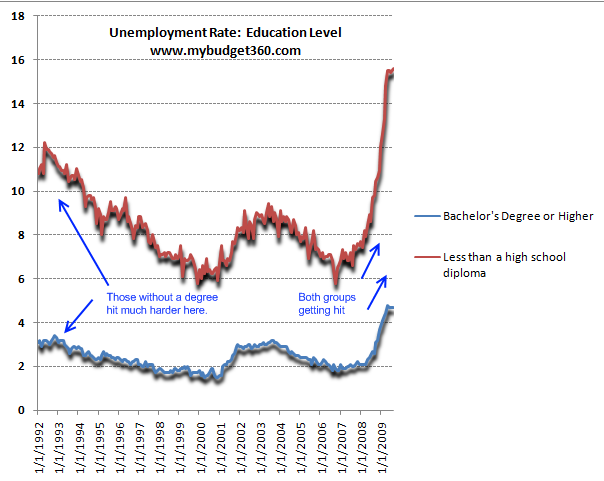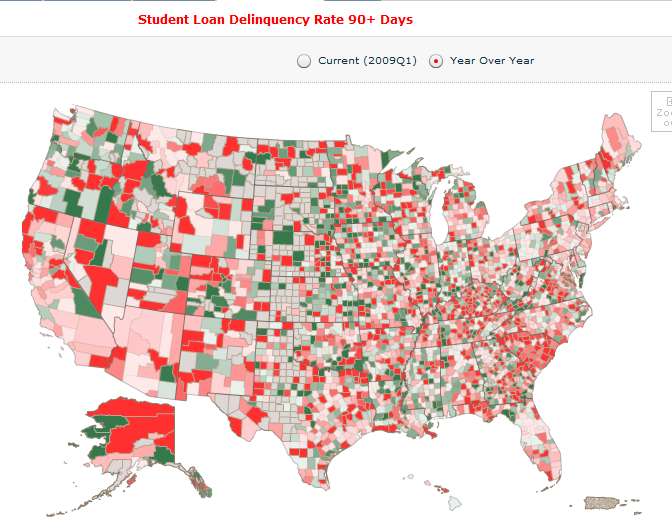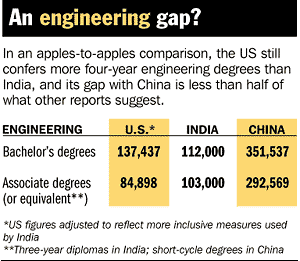As many students begin applying for the 2010 academic school year, students are looking at an economic climate where endowments are hit, student loans are more restrictive, and parents have seen 529 plans sink along side their retirement plans. The upcoming school year will be highly competitive and expensive but will it be worth it? Now college itself isn’t a direct link to a career and many bristle when they hear about vocational training. Yet when someone is paying $50,000 a year, you have to ask what exactly you are paying for.
With the recent unemployment rate hitting 9.7 percent officially, the wider ranging U-6 rate hit a record of 16.8 percent. The market took the 216,000 job losses as good news but the recession is much deeper than the headlines are showing. If you dig deep into the report, you will find a few curious observations. First, the teenage unemployment rate is the highest in nearly half a century coming in at over 24.2 percent. Now this rate is always high but only in August of 2008, it was at 17.8 percent. Another observation in the report that we find is those with college degrees are facing the highest unemployment in two decades since records started being kept.
With college costs going through the roof and in many cases, costing nearly $50,000 a year at private schools many are asking whether some college degrees are even worth pursuing. Or more importantly, potential students are seeking answers regarding value. Let us look at this trend more closely:
You’ll find a curious trend here. Without a doubt, those with a college degree do better in the marketplace. Take a look at the recession in the early 1990s. A college degree seemed to be a better buffer at that time than our current recession. For the first time in record keeping history, the unemployment rate for those with 4-year degrees or higher has passed the 4 percent mark. Keep in mind that in the United States, only one in four has a bachelor’s degree or higher. We tend to think of this group as largely immune but in deep recessions like this one, a college degree no longer protects you from the fluctuations of the market.
The massive increase in college tuition needs to be explored. If you think about someone going to school to pursue a career in say social work, a noble career, is it really worth it to go into $100,000 to $150,000 in debt for a career that pays $30,000 to $40,000 a year? In a situation like this, a student may benefit by going to a lower priced state school instead of a private institution. Certainly many will go to top schools simply because of the implied pedigree of an institution especially if they want to enter into the top law firms or seek higher positions in certain corporate sectors. Yet many are realizing that too much college debt is not a good thing.
If you think this isn’t the case, just look at how many people are having trouble paying their student loan debt. Red means conditions have worsened and this is for 90+ days late year over year:
If you look at the population centers of California, Florida, Texas, and New York student loan debt has worsened practically in the entire state. Clearly the current economic recession has much to do with it but also, the fact that those with college degrees are losing jobs in large numbers as well. Many are no longer able to service their own debt. As we have mentioned, a college degree does not protect your job nor does it assure you in getting one. Some are even suing because of this:
“NEW YORK (CNN) – A recent college graduate is suing her alma mater for $72,000 — the full cost of her tuition and then some — because she cannot find a job.
Trina Thompson, 27, of the Bronx, graduated from New York’s Monroe College in April with a bachelor of business administration degree in information technology.
On July 24, she filed suit against the college in Bronx Supreme Court, alleging that Monroe’s “Office of Career Advancement did not help me with a full-time job placement. I am also suing them because of the stress I have been going through.”
What I find troubling is the idea that simply attending college is the ticket to a job. Also, what is more disturbing is many of the for profit institutions with no pedigree try to push people through to continue getting those nice loan checks each semester:
“In her complaint, Thompson says she seeks $70,000 in reimbursement for her tuition and $2,000 to compensate for the stress of her three-month job search.
As Thompson sees it, any reasonable employer would pounce on an applicant with her academic credentials, which include a 2.7 grade-point average and a solid attendance record. But Monroe’s career-services department has put forth insufficient effort to help her secure employment, she claims.
“They’re supposed to say, ‘I got this student, her attendance is good, her GPA is all right — can you interview this person?’ They’re not doing that,” she said.”
Good attendance? A disciplined worker with no college degree can be punctual 2.7 is not an “all right” GPA. The problem now is that we have someone with “subprime college debt” of $70,000 and no viable job prospects. It would be different if they had only say $10,000 in debt but $70,000 is simply incredible. And how many people are graduating like this into a terrible recession where employers have their pick of potential applicants?
The U.S. Treasury and Federal Reserve seem willing to bailout any mistake so it should be no surprise that students expect bailouts as well. They are simply following the lead of our central bank. It is also a question of what degrees are being awarded. While we had many chasing degrees in finance to pump out paper to increase the housing bubble, globally other nations focused on making actual things:
Even after adjusting lower, we can see why things will remain tough. The globe is hyper competitive now. Many entering college now face the challenge of examining what they want to do with their lives but also, dealing with the economics of a new financial age. A college degree was never a guarantee of a job or career security and this will only become a stronger rule in the future.



No comments:
Post a Comment